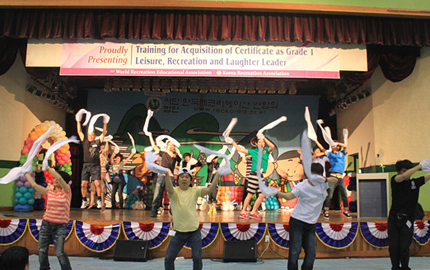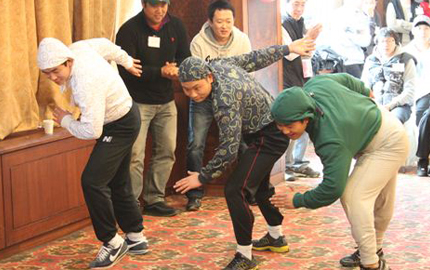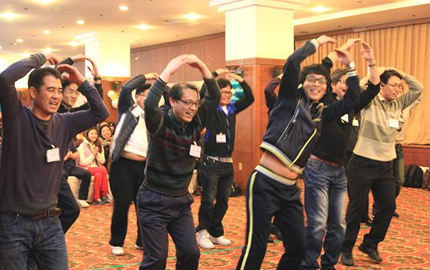1. Conceptual approach of recreation

The concept of recreation is defined differently depending on the country’s social culture and by different scholars. Butler defines recreation as an activity enjoyed during leisure time to satisfy internal desires such as happiness and satisfaction felt personally by people without being externally coerced. Brightbill defines recreation as an activity freely enjoyed during free time in order to gain self-satisfaction.
Sharman defines it as a wise activity enjoyed during leisure time. Newmeye, on the other hand, defines it as an individual or group leisure activity freely and happily enjoyed with intrinsic value not out of necessity or for renumeration. Hutchinsion defines it as a valuable experience of socially acceptable leisure that participants enjoy as a social choice for self-satisfaction. Meyer defines recreation as an activity related to free time motivated by the desire for self-satisfaction gained from the activity itself.
We can define the concept of recreation based on the above claims made by scholars and the content they commonly espouse, as follows: "Recreation is an individually or socio-culturally accepted leisure activity that provides happiness and satisfaction with constructive, educational and creative outcome."
2. Recreation’s fundamental elements
O-jung Kim viewed the fundamental elements of recreation as being a form of individual and group leisure activity; an activity with value; the importance of motivation; and the influence of interaction with society. If to summarize it, it is as follows.
1) Individual and group leisure activity
Recreation is a form of individual or group activity enjoyed for leisure. It is not confined to a special activity but encompasses most activities enjoyed during leisure time. It manifests in physical, emotional, sensual and social forms. Recreation is not a waste of time or a meaningless activity, but enjoyable, creative and constructive, which fosters a cooperative attitude. The value of recreation’s effect is the activity itself and depends on a person’s conditions and attitude toward the activity. Constructive and active participation in recreation, than passive, is more effective.
2) Activity with value
Activities that can be recreation should have intrinsic value. Recreation is a relatively free and enjoyable activity that can appeal to anyone. Human beings have the desire to carry out any activity without being coerced from internal instincts and want to freely enjoy chosen activities. Work and recreation can be distinguished by whether it is an activity for renumeration, coerced, or voluntary and is determined by the emotional attitude toward the activity. Recreational activities provide joy and satisfaction. When an activity is valuable physically, mentally, socially and emotionally, only then can it be recreation.
3) Importance of motivation
Closely linked with the intrinsic value of recreation is the motive of the participant. Recreation’s basic motive lies in the action itself. Recreation is free and voluntary. Recreation provides entertainment to the participant, draws their attention, and at times provides the stimulus to carry out passionate and continuous activities. The satisfaction felt through recreation activities enriches our lives, provides joy and helps to raises the level of our general education. Such recreational activities participated in voluntarily have intrinsic value determined by the response of participants to the activities and their condition.
4) Social and cultural influence
Social stimuli and cultural influence become the basic elements of recreation. These elements restrict the form of leisure activities. Since the motivation for all human behavior comes from social interaction, except for the genetic, the nature of recreation is socio-culturally influenced.
3. Why is recreation education necessary?
The need for recreation education can be found in physical, psychological emotional, social and educational aspects.
First, in terms of the physical aspect, recreation educates through all kinds of activities such as physical education, sports, and games and entails physical movements. Recreational activities greatly help in maintaining physical health throughout life for babies, children, youth, middle aged and the elderly. Roux emphasized the importance of physical activities because if we use the body appropriately, it helps keep the body healthy and enhance development while on the other hand, if we don’t, the body weakens and degenerates.
The development of transportation and goods nowadays has diminished physical activities as do computer-based games, static leisure activities causing obesity and modern illnesses.

Students nowadays have bigger bodies, but their consumption of oxygen has diminished, body fat increased, and muscles and flexibility reduced, resulting in weaker bodies.
Recreation largely entails physical activities, stimulating good metabolism and thus greatly helping to maintain physical health. Also, the joy from recreation stimulates the respiratory, digestive and excretion systems as well as other systems, stimulating the body’s development.
Second, in terms of the emotional aspect, recreation education is necessary. Education nowadays is based on the accumulation of knowledge or centered on entrance to college and grades, without full personal education for sound emotions and personality. For sound emotions and a good personality, recreation education should help to satisfy fundamental human desires and relieve psychological stress in order to form a bright and healthy personality. If tension, insecurity, restlessness, and fear are not released but oppressed, they show up as dissatisfaction, complaints, anger, destruction, aggression and alienation, causing anti-social behavior.
If human beings’ natural instincts are externally oppressed since early age, the resulting dissatisfaction continues until adulthood and looks for an outlet. To prevent this, the importance of game education to control tension and release oppressed emotions since early age is emphasized. Recreation provides psychological stability such as joy, satisfaction, relaxation, alleviation, playing the role of an outlet to express human being’s fundamental desires and bringing emotional soundness and psychological stability full of bright confidence and desires.
Third, if we look at the need for recreation education in terms of the social aspect, Matias emphasized the role of physical activities that centers on the social aspect of interpersonal relations with friends. Children raise their social adaptability by honestly expressing themselves through physical activities. In schools nowadays, introverted and timid children often do not get along with others and are ostracized. On the other hand, some ostracize others from a lack of an embracing and understanding attitude of others with schools suffering from a lack of education on interpersonal relations and sociability.
Various recreation activities have many game elements that increase sociability and social adaptability such as the spirit of cooperation, independence, equality, sacrifice, volunteering, law abiding and etiquette. Therefore, through recreation, our teachers can achieve their objective of increasing sociability with friends. They should often provide recreation activities in which students build friendships and understand each other instead of being exclusive. Of recreation activities, creative group recreation dance, training on communal living, teamwork games and praising games, in particular, are effective in helping students open their hearts to friends they are not close to.

Recreation activities have the characteristics of helping everyone build close harmony, playing an important role in fostering social adaptability and improving interpersonal relations.
I have trained over many years about 70,000 recreation leaders nationwide from all social classes in terms of jobs, age, gender and education level. According to my experiences of recreation training, participants at first express concern that they will have difficulties carrying out communal, and group activities by living and eating with strangers. However, once recreation training starts and after a little while, such concerns dissipate and at the end of the training, they find it difficult parting with other participants and some cry. All activities are preciously kept as memories and forums of harmony and even after the training, they keep meeting to exchange information and build on their relationships. I have thus witnessed the social effect of recreation many times.
Such a simple example testifies to the effect of recreation in raising sociability and social adaptability through communal activities.
Fourth, in terms of the educational aspect, recreation builds good personalities through the education of the whole person. All kinds of recreation activities play many roles physically, emotionally, psychologically and socially as mentioned earlier. Knowledge-based education has its limits in forming a complete human being. Various recreation training such as games and sports help to maintain physical health, stable emotions and psychology, and to form an active and positive personality, thus enhancing confidence. Group activities raise sociability by making participants engage in activities of cooperation, volunteering and consideration, helping to foster emotionally and socially healthy people. Such a role played by recreation contributes to self-accomplishment and self-completion as a complete human being.















